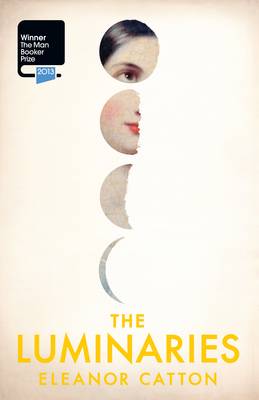Reviewed by gmcgregor on
Shortly before Moody's arrival, a local politician, Alistair Lauderback, arrives in town to stump for votes. On the outskirts of town, he arrives at the cabin of a recluse, Crosbie Wells, and finds the man very recently deceased. And then, on the same night, a lucky young prospector, Emery Staines, goes missing, and a prostitute, Anna Wetherell, publicly overdoses on the opium to which she is addicted and is imprisoned. Each of the men in the bar of the Crown Hotel has a little piece of the story, and even more develops as time goes on. Bit by bit, the full story in all its beauty and tragedy is revealed, connecting the threads of each seemingly-separate piece together.
This is a big, ambitious novel that requires a lot of attention to keep the characters and their relationships with each other in mental order. In lesser hands, it would be confusing, but Catton keeps it engaging, requiring enough consideration to feel compelled to really focus on the book without making it feel like studying. The characters are complex and interesting, and the tangled web of their interactions with each other keep the tension from slacking. Indeed, for such a long book, it keeps itself going remarkably well, a testament to Catton's skill with prose and plotting. The way the layers of the mysteries the book presents are gradually peeled back and revealed is gratifying, feeling like tiny rewards doled out along the way until the end. The themes of loneliness, the role of chance, truth and lies, and revenge all come in and out of focus throughout, each feeling like it's given time and space to develop without being unduly flogged. For me, it was a wonderful book. It's hard to strike the balance between "passively entertaining" and "too much information management required to properly enjoy", but The Luminaries was right in the sweet spot. I got lost in it.
Now that I've just gushed about it, it does have some issues. It's a slow starter, taking advantage of its prodigious length to stretch the story out perhaps more than really necessary. Some characters feel like they get the short shrift and if Catton was less wedded to her astrology conceit, should have been cut. The way Catton reveals a bunch of pertinent information right at the end of the book in flashback, almost like a coda after the "real" ending of the story, does feel a little too cute by half. But honestly, those are mostly nitpicks. I'm not the sort to wish that a book would never end (I'm always excited about something on the horizon), but I did close it with a satisfied sigh and think "what a great book". It's not something to read when you're looking for something breezy and light, but otherwise, I highly highly recommend it.
Reading updates
- Started reading
- 22 September, 2018: Finished reading
- 22 September, 2018: Reviewed
